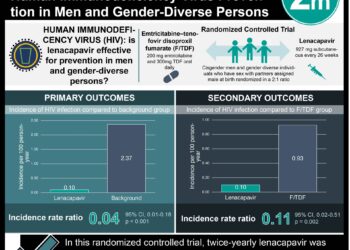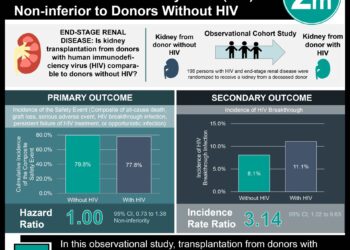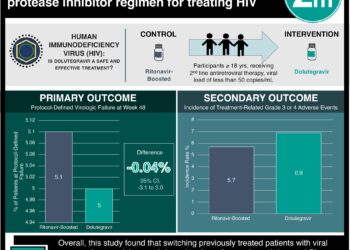Dapivirine-containing vaginal ring linked to reduced HIV-1 transmission
1. In a randomized, placebo-controlled trial of sexually active women in sub-Saharan Africa, dapivirine-containing vaginal rings were linked with a significantly reduced incidence of HIV-1 infection in women over the age of 21.
2. The protective effects of the dapivirine-containing vaginal rings were not seen in the younger group, aged 18 to 21 years, in which adherence rates were also lower.
Evidence Rating Level: 1 (Excellent)
Study Rundown: While studies have shown the effectiveness of antiretroviral-containing medications and gels in prevention of the transmission of HIV-1 infection, adherence to these methods has also been reported as low. This randomized, double blind, placebo-controlled trial investigated if sustained and controlled release of medication can help in HIV-1 transmission prevention. The dapivirine-containing, a non-nucleoside HIV-1 reverse-transcriptase inhibitor, vaginal ring was used in this trial among African women and compared to a placebo.
The results showed that dapivirine-containing vaginal rings were linked with a significantly reduced HIV-1 incidence. The protective effect of the vaginal rings was particularly marked in women over the age of 21 years, a population in which there were higher rates of adherence; this was contrasted to women aged 18 to 21 years in which protective effects were not seen.
The study draws strength from its large sample size and randomized design, with a median follow-up period of 1.6 years. The study was limited by lower-than-expected product adherence at two particular study sites, which were excluded from some of the primary analyses.
Click to read the study, published in NEJM
Relevant Reading: Preexposure prophylaxis for HIV infection among African women
In-Depth [randomized controlled trial]: This study involved 2629 healthy, sexually active, non-pregnant HIV-1-seronegative women aged 18 to 25 years from sites in Malawi, South Africa, Uganda, and Zimbabwe. Participants were randomized to receive a monthly vaginal ring containing 25mg of dapivirine or an indistinguishable placebo ring. Participants were followed for a median of 1.6 years, with the primary efficacy endpoint being HIV-1 infection and ongoing adherence assessment via quarterly plasma sampling for presence of dapivirine.
There were 71 and 97 incidence HIV-1 infections in the dapivirine and placebo groups, respectively, translating to an incidence reduction of 27% (95%CI 1 to 46; p = 0.046). Interestingly, when two sites were excluded from the primary analysis due to lower-than-expected product adherence, the incidence of HIV-1 infection in the dapivirine group was lower by 37% (95%CI 12 to 56; p = 0.007) compared to placebo. The efficacy of HIV-1 protection differed significantly according to age (p = 0.02 for interaction): among women 25 years or older, efficacy was 61% (95%CI 32 to 77; p < 0.001), whereas among women under the age of 25 years, efficacy was 10% (95%CI -41 to 43; p = 0.64). There were no significant between-group differences in the frequency of the primary safety end points (14% in both groups), a composite of any serious adverse event, any grade 3 or 4 adverse event, and any grade 2 adverse event that was assessed as being related to dapivirine.
Image: CC/Wiki
©2016 2 Minute Medicine, Inc. All rights reserved. No works may be reproduced without expressed written consent from 2 Minute Medicine, Inc. Inquire about licensing here. No article should be construed as medical advice and is not intended as such by the authors or by 2 Minute Medicine, Inc.







